Archiv článků
Prohlédněte si všechny články a objevte více zajímavých témat!

Co nového v Evropském parlamentu? Reflexe plenárního zasedání
Rádi bychom Vás pozvali na další ze série debat, které přináší aktuální pohled na klíčová témata projednávaná na plenárních zasedání Evropského parlamentu. Cílem diskusí je nabídnout srozumitelný přehled přijatých rozhodnutí a jejich širší dopad na Evropskou unii i Českou republiku. Každá debata poskytne prostor pro reflexi zásadních legislativních a politických kroků Evropského parlamentu, přímou diskusi s europoslanci a experty, a umožní otevřený dialog s odbornou i širokou veřejností.

Střepiny | Obchodní válka rozpoutaná Donaldem Trumpem
Bílý dům uvalil cla na své obchodní partnery ve snaze obnovit suverenitu USA. Pro pořad Střepiny komentuje analytiku Institutu EUROPEUM Filip Křenek.

New Eastern Europe | Polsko brání Evropu před ruskou hybridní válkou
Co je cílem ruské hybridní války proti Polsku? Je jím podkopat podporu Ukrajiny, a tím v konečném důsledku narušit integritu evropského bezpečnostního řádu zaséváním neshod a rozdělení v EU. Zhoubné úsilí Ruska se zatím ukazuje jako účinné. Obnovená roztržka mezi Polskem a EU kvůli migraci neprospívá nikomu jinému než Rusku a jeho geostrategickým zájmům. Slouží […]

TA3 | Uvalená 20% cla na Evropskou unii
Donald Trump si svojím krokem rozhněval soupeře i dlouhodobé spojence. Nová cla začnou platit už 5. dubna. Pro ta3 komentoval výkonný ředitel Institutu EUROPEUM Martin Vokálek.
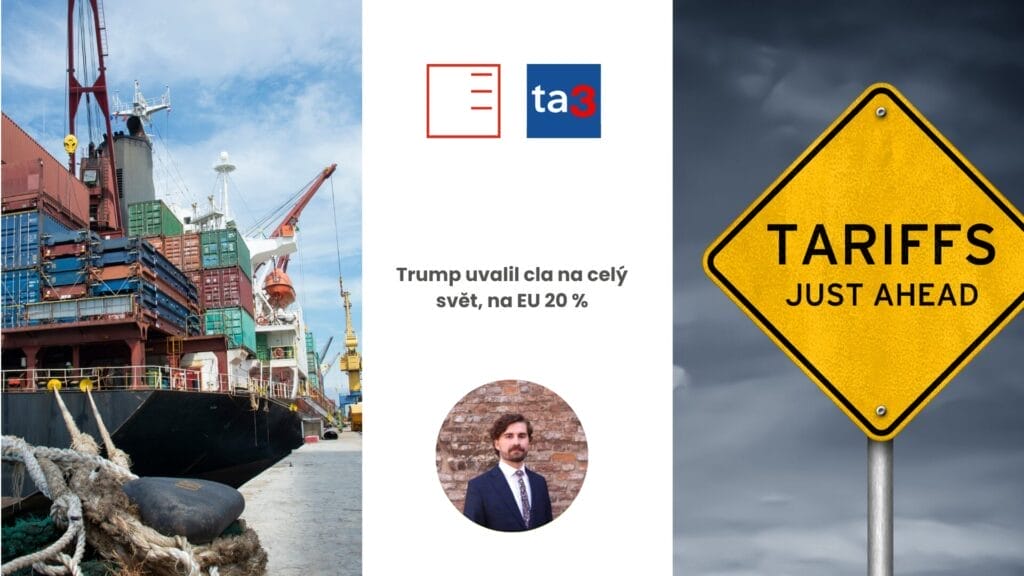
TA3 | Trump uvalil cla na celý svět, na EU 20 %
Donald Trump v podstatě vyhlásil obchodní válku celému světu, včetně svých nejbližších dosavadních spojenců. Dlouhodobě o Evropě mluví jako o konkurentech, teď se k nám chová jako k nepřátelům. Pro ta3 komentoval zástupce ředitele Institutu EUROPEUM Viktor Daněk.
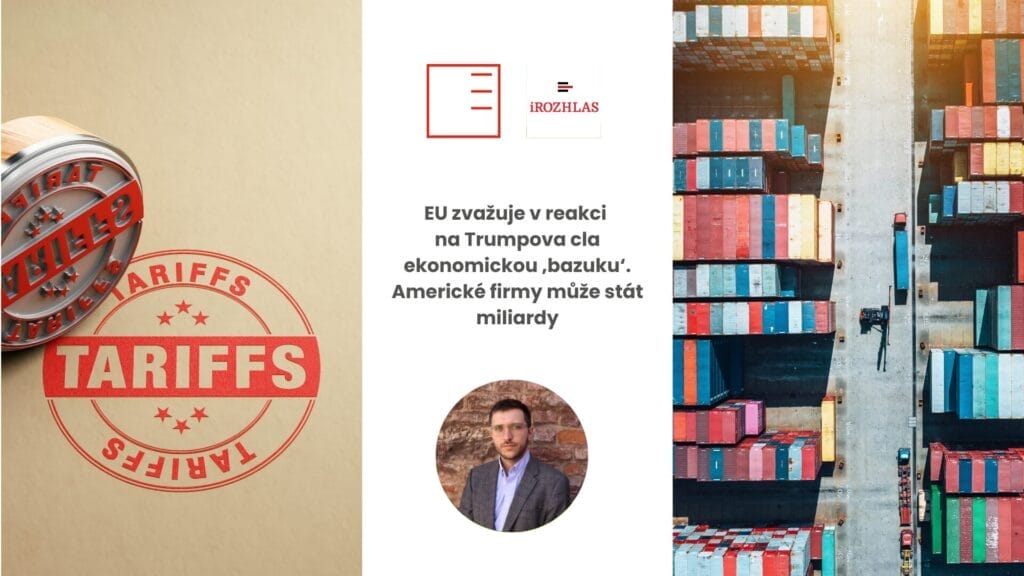
iROZHLAS | EU zvažuje v reakci na Trumpova cla ekonomickou ‚bazuku‘. Americké firmy může stát miliardy
Dva roky staré a zatím nikdy nepoužité. Takzvaný nástroj o ochraně před hospodářským nátlakem je jednou z možností, po které může Evropská unie sáhnout v reakci na cla, která vyhlásil americký prezident Donald Trump. Krajní možností by bylo částečné odstřižení amerických bank od evropských veřejných zakázek. Jde o projekty v objemu až dvou bilionů eur ročně (asi 50 bilionů korun). Pro iROZHLAS komentuje analytik Institutu EUROPEUM Filip Křenek.
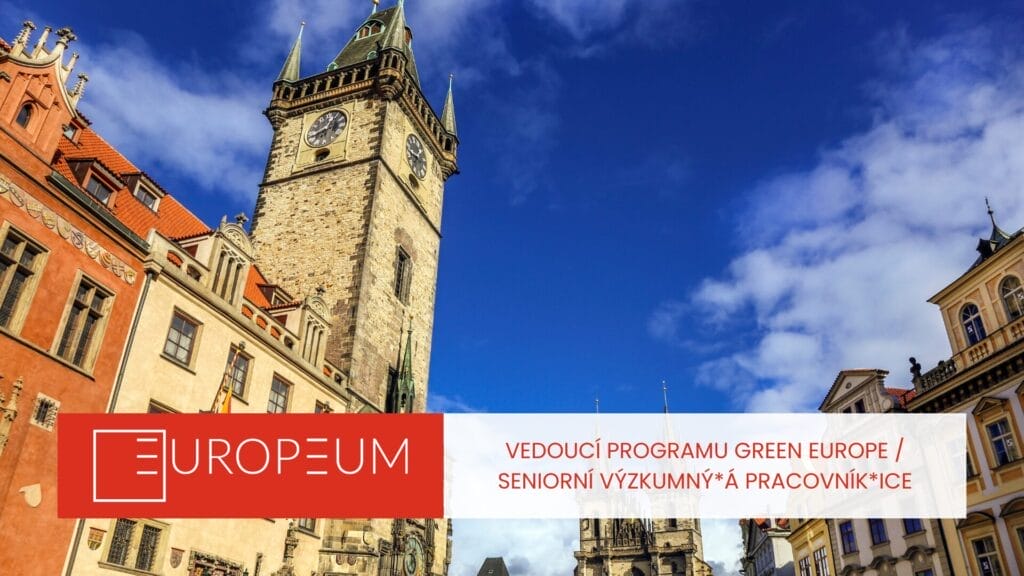
Vedoucí programu Green Europe / Seniorní výzkumný/á pracovník/ice
V Institutu pro evropskou politiku EUROPEUM hledáme vedoucí/-ho výzkumného programu Zelená Evropa se zaměřením na témata jako je klimatická politika EU, dekarbonizace průmyslu, clean tech, konkurenceschopnost EU a Česka, role EU jako globálního hráče, spravedlivá transformace, klimatická adaptace, dopravní chudoba, fondy EU, politika soudržnosti a ekonomická bezpečnost.
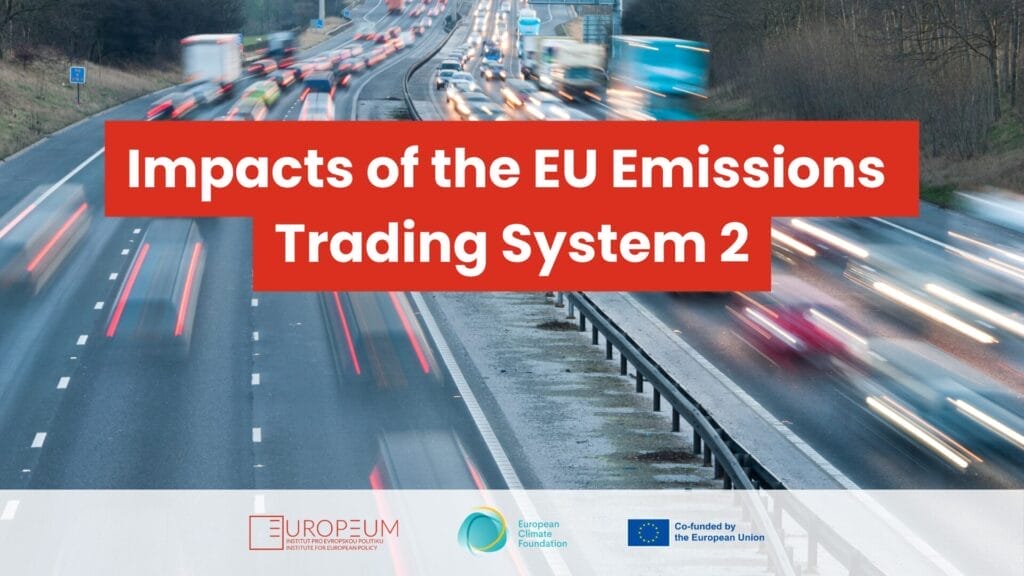
Impacts of the EU Emissions Trading System 2
Tento projekt se zaměřuje na zkoumání potenciálních dopadů druhé fáze Evropského systému obchodování s emisemi (ETS2) na nejzranitelnější domácnosti v Evropě, s důrazem na minimalizaci rizik, která by mohla vést k veřejnému odporu proti politikám EU zaměřeným na dekarbonizaci dopravy. Cílem aktivit projektu je přispět k širšímu začlenění konceptu dopravní chudoby, jejími příčinami a řešeními, do českého kontextu.

CNN Prima News | O emisních povolenkách na dopravu a bydlení se stále jedná
Emisní povolenky na dopravu a bydlení mají začít platit od roku 2027. Premiér Petr Fiala chce účinnost směrnice posunout alespoň o jeden rok. Naopak hnutí ANO ji hodlá úplně zrušit, pokud se dostane k moci. Když ale Česko evropskou směrnici nepřijme, hrozí mu finanční postih. Situaci komentoval pro CNN Prima News analytik Institutu EUROPEUM Filip Křenek.
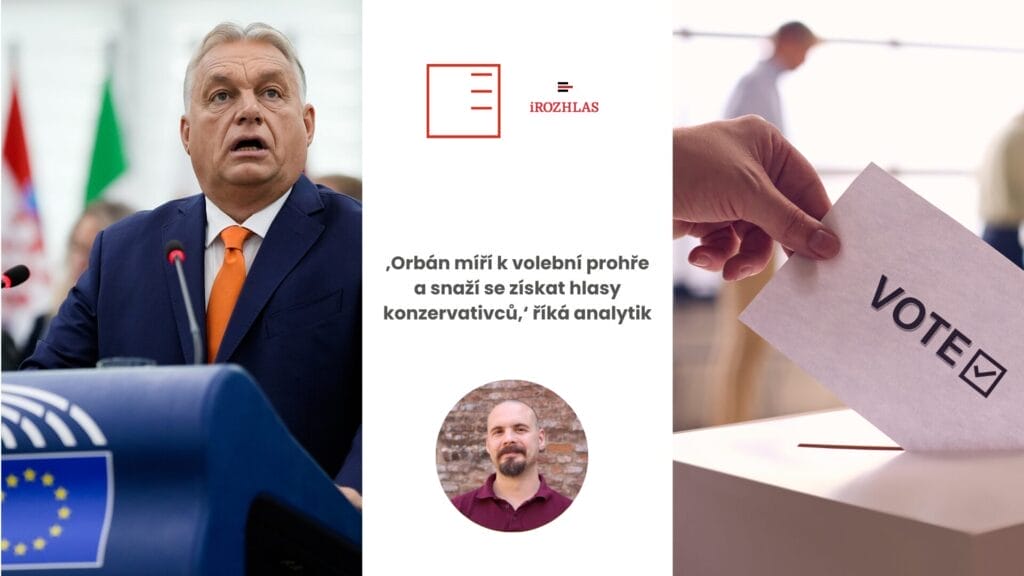
iROZHLAS | ,Orbán míří k volební prohře a snaží se získat hlasy konzervativců,‘ říká analytik
Maďarsko čekají za rok volby a předvolební průzkumy předpovídají, že by premiér Viktor Orbán se svou stranou Fidesz mohl skončit v opozici. „Orbán má nejnižší podporu od roku 2010 a uvědomuje si to. Svými kroky proti opozici, LGBT a dalším si snaží udržet konzervativní jádro svých voličů,“ říká v rozhovoru pro iROZHLAS.cz maďarský analytik Institutu EUROPEUM Oszkár Roginer-Hofmeister.
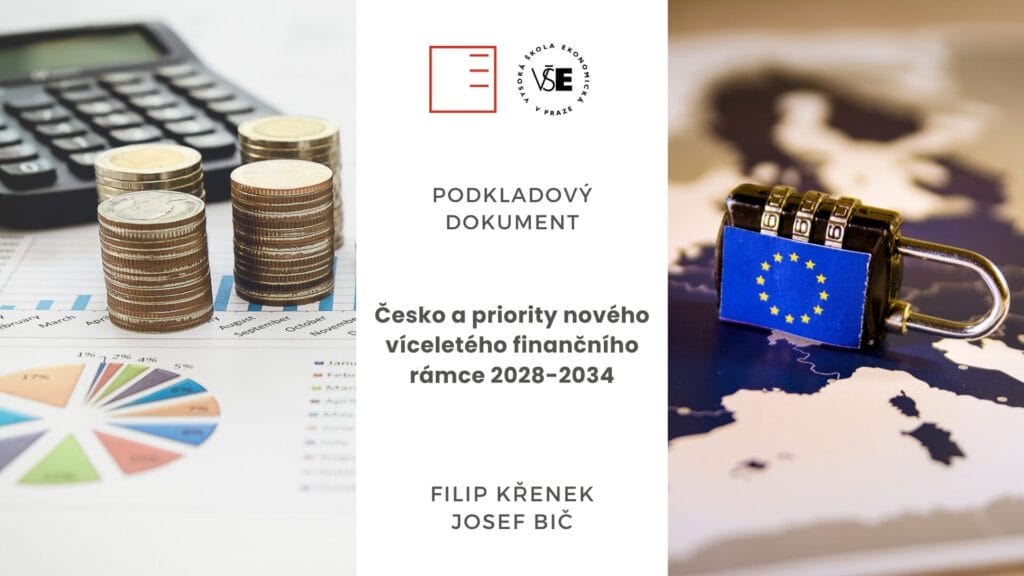
Podkladový dokument | Česko a priority nového víceletého finančního rámce 2028-2034
Víceletý finanční rámec (VFR) je klíčovým nástrojem EU určujícím výdajovou i příjmovou složku společného evropského rozpočtu. Jednání o dlouhodobém rozpočtu je na evropské úrovni jedním z těch nejdůležitějších a nejzdlouhavějších. Rozhoduje se při něm o celkových výdajích v tradičních oblastech, jako jsou zemědělství či koheze, ale také o nových prioritách, jako jsou obrana a konkurenceschopnost. Návrh finančního rámce pro období 2028-2034 by měla Evropská komise předložit do poloviny roku 2025, neformální jednání o podobě návrhu však probíhají již nyní na pracovní i politické úrovni – nový Evropský komisař pro rozpočet proto nyní objíždí členské státy a Komise spustila k tématu veřejnou konzultaci.
Komise již představila hrubé obrysy příštího VFR, včetně většího zaměření na efektivitu, přidanou hodnotu a zjednodušování. Zároveň zdůraznila potřebu větší flexibility, aby rozpočet dokázal lépe reagovat na krize. Vzhledem k množství (staro)nových priorit, včetně obrany, klimatu a konkurenceschopnosti, se otevírá také otázka velikosti příštího evropského rozpočtu a nových vlastních zdrojů. Aktuální debata o českých prioritách v rámci příštího VFR je proto více než příhodná a Česko by mělo aktivně vstupovat do jednání na celoevropské úrovni.
Podkladový dokument pro kulatý stůl Národního konventu o EU zpracovali Josef Bič (FSV VŠE) a Filip Křenek (EUROPEUM).
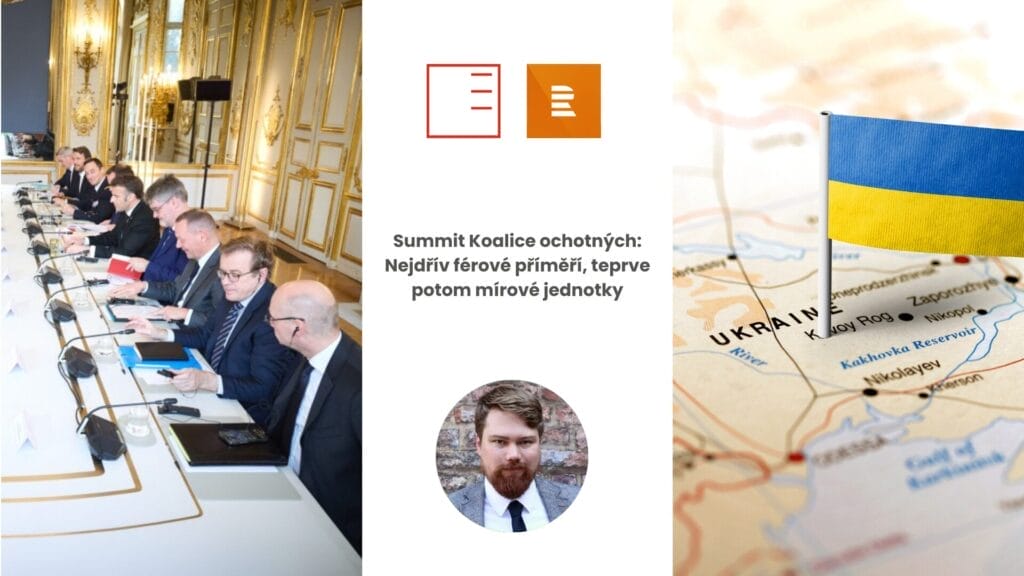
ČRo Plus | Summit Koalice ochotných: Nejdřív férové příměří, teprve potom mírové jednotky
Francie a Velká Británie vyšlou na Ukrajinu tým expertů, který má zhodnotit potřeby tamní armády. Oznámily to na summitu koalice ochotných v Paříži, kde se sešli zástupci třiceti zemí včetně české delegace vedené premiérem Petrem Fialou. Co dalšího summit přinesl? A jakým směrem se mohou ubírat mírová jednání v následujících týdnech? Pro Český rozhlas Plus situace komentoval generální ředitel Institutu EUROPEUM Martin Vokálek.